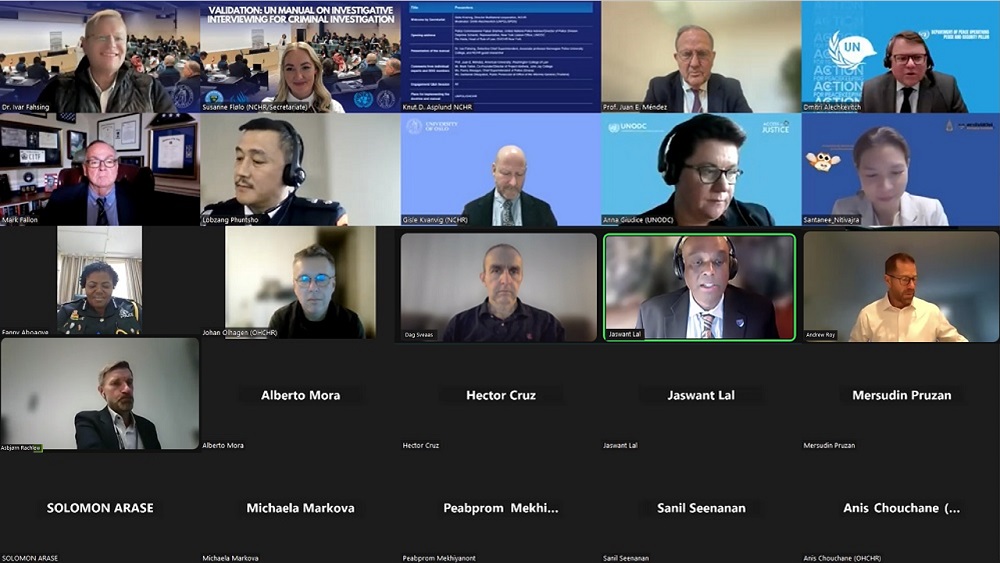With the official validation of the manual, the whole UN family now has a new tool for effective and human rights-compliant policing, integrating human rights in law enforcement. The manual is expected to improve interviewing practices around the world, allowing for better and more effective investigations while promoting the principles of presumption of innocence, freedom from torture and ill-treatment, and freedom from arbitrary arrest.
During the digital validation meeting, the manual was approved by more than 30 UN experts and state representatives that make up the Doctrinal Development Group. Representatives from The UN Department of Peace Operations (DPO), the Office of the High Commissioner for Human Rights, and the UN Office on Drugs and Crime (UNODC) celebrated the launch of the joint manual and signaled their support. Several highlighted the manual’s potential for a profound global impact on policing practices.
A “One UN” initiative
The UN Department of Peace Operations initiated the process of developing the manual on investigative interviewing for criminal investigations together with the Office of the High Commissioner for Human Rights (OHCHR), the United Nations Office on Drugs and Crime (UNODC). The Norwegian Centre for Human Rights has been the Secretariat for the drafting and editing process, supported by the Norwegian Ministry of Foreign Affairs.
Prior to the validation yesterday, the manual has been approved by the Under Secretary Generals of the DPO, the OHCHR, and at technical level by the UNODC. Extensive consultations were held during the development of the manual. The draft was circulated to 193 member states, UNPOL components in field missions, and various task forces and expert groups for further feedback and consultation. Experts from 25 UN member states, and representatives of UN agencies provided inputs to ensure the effectiveness of the manual. The manual has also been through consultative rounds among the UN organizations which mandates touch upon policing. This includes UNICEF, UNWOMEN and UNDP.

A comprehensive framework for effective and human rights compliant policing
Interviews are an indispensable component of investigations and information-gathering operations. The manner in which police and other law enforcement agencies conduct interviews has a profound impact on the outcome, fairness, efficiency, and reliability of any investigation and subsequent criminal proceedings. However, the reliance on presumptions of guilt and confession-driven practices increases the risk of wrongful convictions and torture.
[…] the manual provides a concrete alternative to coercive interrogations techniques. It offers a standardized approach that is ethical, compliant with the law, non-coercive and at the same time effective in obtaining complete, accurate and reliable information required for the investigation.
- Police Commissioner Faisal Shahkar, the United Nations Police Adviser in the Department of Peace Operations (DPO)
The UN Manual on Investigative Interviewing for Criminal Investigation aims to provide a comprehensive framework for conducting non-coercive interviews and is based on growing evidence-based research, normative legal frameworks that prohibit torture, and the Principles on Effective Interviewing for Investigation and Information Gathering, also known as the Méndez Principles.
Improving Interviewing Practices in Conflict Zones
Once signed-off, the manual will serve as an authoritative yet non-binding guide for conducting non-coercive interviews in all UN operations at country level. It will provide UNPOL officers with an analytical framework for conducting investigative interviews and guide UN entities, including UNPOL components, in capacity-building and development workstreams.
The manual can also be utilized by member state police and law enforcement officials, practitioners, and other relevant agencies to ensure ethical conduct during investigative interviews or to provide technical assistance to member/host states.
This manual aims to improve interviewing practices, particularly in conflict and post-conflict environments where UNPOL components often undertake their mandated roles. By operationalising crucial legal thresholds and promoting the principles of presumption of innocence, freedom from torture and ill-treatment, and freedom from arbitrary arrest, the manual aligns with international human rights law and UNPOL's Strategic Guidance Framework for International Police Peacekeeping.
By providing sound guidance and effective training, the joint manual on investigative interviewing seeks to minimize the risk of false confessions, wrongful convictions, and the use of coercive methods. It is a crucial step forward in ensuring fair and just criminal investigations around the world.
View agenda and concept note for the validation event for more information.
